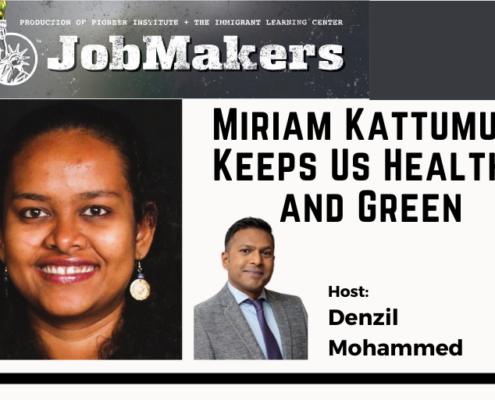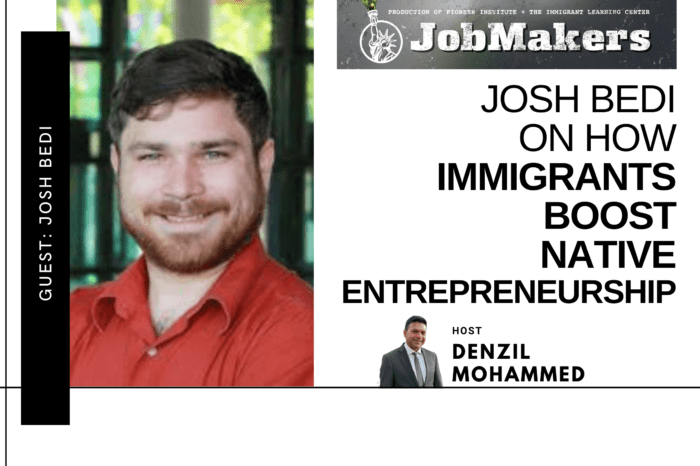Josh Bedi on How Immigrants Boost Native Entrepreneurship
/in Economic Opportunity, Featured, JobMakers /by Editorial Staff
This week on JobMakers, host Denzil Mohammed talks with Dr. Joshua Bedi, child of an immigrant and postdoctoral researcher in entrepreneurship in the Department of Strategy and Innovation at Copenhagen Business School in Denmark. He is the son of an immigrant who relocated from India to Jackson, Mississippi, and started a business. It was a simple neighborhood gas station, but also a symbol of what hardworking immigrants can do to boost innovation and business generation in host countries, as you’ll learn in this week’s JobMakers podcast.
Guest:
 Josh Bedi is Senior Fellow in Economic Opportunity at Pioneer Institute. He began his undergraduate career with the International Business Program at Mississippi State University and received a Bachelor of Business Administration in Business Economics and a Bachelor of Arts in German. At Mississippi State, he worked with Germany Trade and Invest as a Service Industries Intern. He earned his Ph.D. and was a Mercatus Center Fellow at George Mason University. He is now working at Copenhagen Business School as a Postdoc in Entrepreneurship at the Department of Strategy and Innovation. There, he works under the Mærsk McKinney Møller Chair in Entrepreneurship.
Josh Bedi is Senior Fellow in Economic Opportunity at Pioneer Institute. He began his undergraduate career with the International Business Program at Mississippi State University and received a Bachelor of Business Administration in Business Economics and a Bachelor of Arts in German. At Mississippi State, he worked with Germany Trade and Invest as a Service Industries Intern. He earned his Ph.D. and was a Mercatus Center Fellow at George Mason University. He is now working at Copenhagen Business School as a Postdoc in Entrepreneurship at the Department of Strategy and Innovation. There, he works under the Mærsk McKinney Møller Chair in Entrepreneurship.
Get new episodes of JobMakers in your inbox!
Read a Transcript of This Episode
Please excuse typos.
Denzil Mohammed:
I’m Denzil Mohammed. Welcome to JobMakers.
Denzil Mohammed:
We’ve looked at the research on immigrants and entrepreneurship before in the US they’re twice as likely to start a business, innovate and create jobs. Why is that? One big reason is who immigrants are, their qualities and strengths, the things that make them take a risk and move to Newland in the first place. But that’s not all they do. For Dr. Joshua Bedi, child and immigrant and post-doctoral researcher in entrepreneurship in the Department of Strategy and Innovation at Copenhagen Business School in Denmark, not only are immigrants more adept at entrepreneurship in the US and worldwide, they also boost the innovation and business generation of citizens in host countries. That’s a huge net benefit to the countries to which immigrants and refugees move. And the research proves it. Joshua sees this not only in the data, but also in his own personal experience. The son of an immigrant to Jackson, Mississippi from India, his father started a business himself. It was a simple neighborhood gas station, but also a symbol of what hardworking immigrants can do when they move to new lands. And their backs are against the wall as you learn in this week’s JobMakers podcast,
Denzil Mohammed:
Dr. Joshua Bedi, postdoc and entrepreneurship at the Department of Strategy and Innovation at Copenhagen Business School. And alum from the Mercatus Center at George Mason University. Welcome to the JobMakers Podcast. How are you?
Josh Bedi:
I’m great, Denzil. Thanks for having me.
Denzil Mohammed:
So you study immigrant entrepreneurship, , academically of course, but , it’s also part of your family history, right?
Josh Bedi:
Yeah, absolutely. So, , I’m, I guess a second generation immigrant. My dad came over here from Punjab, India. , my mom’s from the US so I had kind of a mixed, , family background.
Denzil Mohammed:
And your father ended up owning his own business as an immigrant entrepreneur?
Josh Bedi:
Yeah, exactly. So, , a few of my relatives ended up owning their own businesses as immigrant entrepreneurs, and that’s how he got into, that’s how he got into owning his own business. So my great uncle owned owned a few gas stations and, , you know, that’s how my dad got into it.
Denzil Mohammed:
And what was it like for you as a child of immigrants actually working in that business? How did what, what was that like?
Josh Bedi:
Well, so I mean, I I, I thought it was pretty fun, , at the time, right? , not a lot of people had immigrant, , not a lot of people had parents who owned their own business. And so I thought that was pretty novel. , I always felt pretty American though, right? I mean, I had, I have a bunch of Indian, , family, but, , it wasn’t so much that my dad was an immigrant entrepreneur that was novel to me, but it was that he was an entrepreneur. I even remember one day, you know, in class, , we were talking about entrepreneurship, you know, in elementary school. And one of the, , one of the teachers asked if any of us do an entrepreneur. And I was like, oh, you know, my dad’s an entrepreneur. And she made sure that I knew what the definition of an entrepreneur was, cuz she didn’t believe me at first. And so, yeah, I thought that, I thought that was cool, you know, and I like, I like working behind the register and, , stocking up the beer and all that stuff. , yeah. So
Denzil Mohammed:
Tell me a little bit about your research as specifically on immigrant entrepreneurship. I know you look into the factors that affect entrepreneurship activity in a host country. Right?
Josh Bedi:
Well, so generally, um, we find that immigrants are more entrepreneurial, right? But that’s, that’s kind of an obvious thing. Um, but right now in this new, in this newest research that I’m looking at, we’re starting to find that, , it’s the immigrants who have Danish citizenship that are driving these, , these higher entrepreneurship rates. And in fact, um, the impact of not having Danish citizenship, the negative impact of not having Danish citizenship on the likelihood of becoming an entrepreneur, we’re finding is greatest for immigrants. It, , as opposed to other types of individuals because in Denmark you can, , be born in Denmark and not have to citizenship, right? So we can compare non movers with people who move internally, , with international immigrants and also with return immigrants. So we can look at people who left Denmark and came back and see if they’re more entrepreneurial and see how citizenship affects their entrepreneurship, right?
Josh Bedi:
And so we find immigrants are the most entrepreneurial, followed by return immigrants, which is really interesting. , and we also find that having foreign citizenship particularly, , , particularly foreign citizenship that’s very restrictive, , we find that that negatively moderates the relationship. So we find that that, , makes it less likely for immigrants to be entrepreneurial, particularly immigrants. So it has, it has a more negative impact for immigrants than it does for, say, return immigrants or, um, or internal migrants. And in fact, what I’m seeing is we’re finding that the, , the, um, non movers who are foreign citizens are actually more entrepreneurial than the non movers who are Danish citizens. So that’s the only exception. And, , that probably has to do with the fact that if you were born in Denmark and you don’t have foreign citizenship, at least one of your parents has to be an immigrant. And so it could be that they’re just getting foreign exposure secondhand from their parents, and that’s causing them to be more entrepreneurial. But I, I mean that’s, but that’s a, , that’s kind of a guess, right?
Denzil Mohammed:
So immigration is driving entrepreneurship no matter what. Argue you look at it, right?
Josh Bedi:
That’s what it looks like, right.
Denzil Mohammed:
Given the, that, that is your finding about immigration driving entrepreneurship is so clear mm-hmm. <affirmative>, are there visas built into the immigration system that are specifically for entrepreneurs?
Josh Bedi:
Yeah, so I mean, , there are in the US now, the problem with those is they require a lot of upfront capital, , in order for the person to be eligible for the visa. So you’re, you’re excluding a lot of your sole proprietorships say, from being able to come in on that visa in Denmark. , I don’t know about self-employment visas in particular, but there are definitely, , visas for, say, high skill managers, um, who might play entrepreneurial roles inside of a company. And I actually benefit from a type of visa like that. So you have these high skilled managers, but you also have researchers, and they have a special visa for those two people. And we actually get a lower tax rate than the average Danish person. So, , there’s even a tax incentive, at least in Denmark, to kind of attract top level managers and researchers to come.
Denzil Mohammed:
And in that pool, you bound to find people who end up starting their own businesses. Well, that’s a push factor or pull factor. Um, so if you were to speculate as to why people who move are more likely to engage in entrepreneurship, generating businesses, creating jobs, what do you think it would be? Why?
Josh Bedi:
I think it’s a couple reasons. So my first theory when I first got into this is that, um, and I think I’ve heard you say this before, is that, is that immigration is an inherently entrepreneurial action, right? If we think of entrepreneurship as trying to better your circumstances in the face of radical uncertainty, that’s exactly what immigration is. It’s a huge upfront investment that you’re making. There’s a lot of risk involved, even for low skilled immigrants, especially for, say, undocumented immigrants. There’s a ton of risk involved. Cause you could get sent back and that’s you putting down years worth of your wages maybe to hire a coyote and get sent back. And so you’re taking a huge risk. And so there’s kind of this selection bias that the type of person it takes to immigrate and to take this kind of risk and to try these new things is also the type of person who’s willing to be open minded and to try new business ideas and to engage in a certain level of risk.
Josh Bedi:
But I also think there are things that happen after the migration process, or maybe during the migration process, after you come into the country, , into the host country, that causes you to be more entrepreneurial. And so there’s a certain type of adaptation that has to take place after you come into the host country. And I know from personal experience coming from the US to Denmark, which are two relatively similar countries, by the way, I can get around speaking English, but there’s still a little bit of a culture shock, right? And you have to adapt to your new environment. You have to figure out how to get, , basic essentials like toiletries and where those are in the stores because they’re in different types of stores and you have to figure out how to find them on the shelves. And so you, , you, you, you’re forced to learn how to adapt.
Josh Bedi:
And then there’s also cross-cultural experience. And I think that partly explains why we see that return. Immigrants are entrepreneurial in similar ways that immigrants are, because maybe they’re not born outside of their, , maybe they’re not born outside of the host country, but they get that cross-cultural experience by going abroad. And all entrepreneurship is, is opportunity identification. And when you get more cross-cultural experience, you see more different ways of doing things, you’re able to expand your knowledge set, you’re able to draw on these different experiences and relate them to your, , to your home country and try out new ideas that maybe natives haven’t thought to try out before.
Denzil Mohammed:
So I often say that diversity is a huge strength of the United States. Um, and what you’re telling me, this diversity of experiences, cross-cultural experiences is a net benefit when it comes to the economy, right?
Josh Bedi:
Absolutely. Absolutely. I mean, there’s, , and there’s a ton of research on the, on the benefits of immigration generally for the economy. Michael Clemens has a famous paper. , he, he actually just started, or he’s gonna start soon at George Mason University, , trillion dollar bills on the sidewalk. , where, you know, he estimates, he does a survey of the literature and es and we see estimates of, , the benefits of open borders anywhere from, , from multiplying GDP by 1.5 to doubling it, right? So, um, yeah, absolutely. And it’s, and it doesn’t have to just be the immigrants themselves who are entrepreneurs to kind of lead this, this innovative process. We can have gains from even letting low good immigrants in, right? So we can have indirect benefits because these low good immigrants are willing to work for less pay. , and the immigrant who mows the lawn of the nuclear physicist indirectly helps to, , unlock the secrets of the universe.
Josh Bedi:
Right? I, I, I heard that quote, , Alex tab Rock gave a, gave a TED talk, um, and, , and gave that quote, and it stuck with me, right? Because, , we see a lot of research that shows, um, all these indirect impacts of immigration that that could, that could, , that could influence entrepreneurship. So another example of that is we see a decrease in the gender wage gap in the US when we see influxes of immigrants who work in, , industries that are traditionally female dominated by cleaning industries, because it frees up women’s time to be able to go do the things that they wanna do, and that decreases the gender gap, right? Um, and so absolutely, I think it’s in that benefit for the economy.
Denzil Mohammed:
And do you see immigrant entrepreneurship positively affecting native entrepreneurship?
Josh Bedi:
Oh, yes. So, um, we have direct evidence of this, , depending on what kind of proxy of entrepreneurship we’re looking at. So I know that there’s research, , by Jennifer Hunt, and that looks at patent rates among foreign-born people in STEM fields, and they find that there’s a positive spillover effect. And so we see that it’s not the fact that it’s not the case that these immigrants are replacing native inventors. Instead, they’re kind of collaborating with native inventors. They’re bringing out the best of native inventors, they’re increasing the productivity of those native inventors. There are also other, um, other studies that look at, , kind of natural experiments, like a sudden death of someone working on a patent. And so they’ll look, they looked at, um, they looked at native patent holders who were partners with immigrant patent holders, and they found, or at least people working on a patent. And they found that when the immigrant, if the immigrant died, suddenly the probability of that patent being accepted later decreased significantly. , and the same is not true for if the native founder dies suddenly. And so there’s a huge positive spillover
Denzil Mohammed:
That that’s pretty incredible. And, you know, you think of, you know, the most obvious example in my head is Moderna, which has multiple founders. Some are foreign born, some are US born. And so that collaboration you’re talking about does engender innovation and productivity and, you know, in the real world jobs and vaccines, um, as a researcher, have you seen this as any sort of similar kind of, um, , research innovation when it comes to collaborating with, with different people, with different perspectives, different backgrounds?
Josh Bedi:
Absolutely. I mean, um, you see it all the time. So, I mean, we’re basically talking about different comparative advantages, right? We’re all we’re saying is something that every economist knows, , from the beginning of their training is that there’s gains from trade because we’re all, , we all have a comparative advantage in something different. And so when it comes to research nowadays, you have to have a really good empirical method to get published well, and you have to have a, a really good story, a really good theory behind it. And so a lot of times I see foreign researchers who maybe aren’t as good as, or aren’t as good at English, but they do very well in mathematics, pair up with native researchers who aren’t as good at mathematics. , but obviously they’re good at English because it’s their native language, and they collaborate and come up with awesome research together. And so we see that often. Um, and even people from different, , from different countries. You often see people collaborating from different countries who can get different perspectives. Um, I know there are a lot of things that I don’t consider right off the bat coming from the us, , compared to somebody who comes from, say, Europe.
Denzil Mohammed:
And if someone were to come to you and say, well, you’re saying this fine, but what about countries like Japan?
Josh Bedi:
Well, I mean, I guess we’ll never know the counterfactual, right? So how innovative would they have been if they had opened up their borders, right? Because they are a very restrictive country when it comes to immigration. And , if someone brought up Japan, I would just point to, , demographic worries, right? They’re losing population, which isn’t good for their long term growth. Um, and yeah, so I I I would say, you know, what is the counterfactual? Do we think they would’ve been less innovative if we had allowed immigration, or would they have experienced the same level of innovation or even more, right? And for me, , it’s, it’s not just a practical issue, right? So if we’re going to restrict the freedom of movement of a bunch of people, then we need to do so with a lot of justification, right? So I think if we’re gonna do so, then it needs to be, because we think they would’ve been a lot less innovative, , had they allowed that immigration to happen. And I don’t think there’s any, any kind of evidence that points to that being the case.
Denzil Mohammed:
And we just have to look at the size of our economy versus other countries, , that, that immigration was able to foster. I wanna just emphasize you, you mentioned that it’s not just, we are not just talking about, , high skilled workers. We talk about low skilled workers as well. Mm-hmm. <affirmative> who may start a nail salon or a hair dressing salon, um, and who as workers also help to grow the economy. Can you speak a little bit to that, that we, it’s not just that we need the best and the brightest, we just need people who are hardworking, right?
Josh Bedi:
Yeah, exactly. Um, so there are those people, right? There are those people who are low skilled, who are going to, , become entrepreneurs themselves and are gonna contribute to the economy. Maybe they hire natives. I know in the case of my, um, of my Indian relatives who have opened up gas stations and hotels, they hire natives, right? It is true that they do pull from their social pool or from their, um, um, social capital in that they hire other Indians, other, , other people who come from their family and things like this. But they also hire natives too, right? So they help in that way, and they also provide goods and services, right? Um, I have heard people complain about immigrant businesses saying, oh, they only, you know, they only hire other immigrants, or they only hire their family so they don’t contribute to the economy, but then they go eat at the restaurant.
Josh Bedi:
And so my, my answer to that is, are, I mean, is is you eating it? There’s restaurant not a contribution to the economy, right? Are they not, , filling up some unmet need? And so there’s that, and there’s, there’s also the idea that, , immigrants aren’t, , you know, to some of the points you’ve made, , and that we’ve been making, immigrants aren’t, um, perfect substitutes for natives, right? They compliment natives in different ways. The average skill set of immigrants from different places is gonna be different than the average skill set of natives. And so we can have complementarities, and those complementaries could be in the form of immigrants hiring natives, but they also could be in the form of, say, a native who has a construction crew. And he’s a, he’s a private contractor, and he hires a bunch of immigrants, right? And in fact, we even see, , there’s some working papers, or at least one working paper that shows there was a Mexican, , repatriation act in, um, in the twenties and thirties, twenties or thirties. And they find it was a mass deportation, basically. And they find that this mass deportation decreased native employment, right? And so, , that completely cuts against the idea that they’re taking jobs from natives, right?
Denzil Mohammed:
And I wanna push back on that idea of, oh, they only hire their own, um, social capital is really important to foreign born people in a host country. They don’t have a lot more to rely on. They will not be the ones who will, may easily get loans or may not, may not know how to navigate city Hall in order to find some sort of assistance. So, you know, hiring your own has a lot of benefits when it comes to, , the entrepreneur and people that he hires. It’s a sense of community. And so many communities, , foreign born communities who have come to the US have grown in that way. Um, and as you, you said, they may need to hire a contractor to expand their business, which may be a US born person. , they may need cleaners, they may need, , their foods, their food tend to be delivered by truck drivers who are US born.
Denzil Mohammed:
So in this satellite and downstream industries, you create more jobs. Um, if we were to close by some sort of reflection, , personally on your family’s history with entrepreneurship and the kind of things that you are seeing in your research, um, what is special about that? That person who starts a gas station or comes up with a vaccine who is in a country that he was not born in, or she was not born in, they didn’t know all the rules, they didn’t know all the laws, they didn’t know all the culture, but they still were able to innovate or create something. Um, reflect on that for a little bit, , given your father’s side of the family.
Josh Bedi:
Well, so I think, I think that kind of person is somebody who is comfortable with uncertainty, which is something that an entrepreneur has to be very comfortable with. I think it’s somebody who is adaptable. I think they, , do not allow barriers, be they legal barriers or cultural barriers or language barriers. I think, I think it’s someone that doesn’t allow those barriers to dissuade them, right? If anything, , they may find it to be a challenge to overcome. And so, yeah, I think it’s someone who’s ultra adaptable and, um, very, very okay with uncertainty, really. I think if there’s, if there’s a closing sentiment, it’s, it’s be nice to the local immigrant, right? Cause he has a lot more to deal with than you give him credit for.
Denzil Mohammed:
If we were to be welcoming our communities would really thrive, right?
Josh Bedi:
Yeah. , yeah, I absolutely think so. Both communities,
Denzil Mohammed:
Precisely. Dr. Joshua Bedi, postdoc and entrepreneurship at the Department of Strategy and Innovation at the Copenhagen Business School. , thank you for joining us on the JobMakers podcast. Thanks for having me. JobMakers is a weekly podcast about immigrant entrepreneurship and contribution produced by Pioneer Institute, a think tank in Boston, and the Immigrant Learning Center in Malden, Massachusetts, a not-for-profit that gives immigrants a voice. Thanks for joining us for this week’s deep dive into the research and personal experiences of immigrant entrepreneurship. If you know us, an outstanding business owner or innovator, we should interview, please email Denzil. That’s D E N Z I l@jobmakerspodcast.org. I’m Denzil Mohammed. See you next Thursday at noon for another Jobmakers.
Recent Episodes:
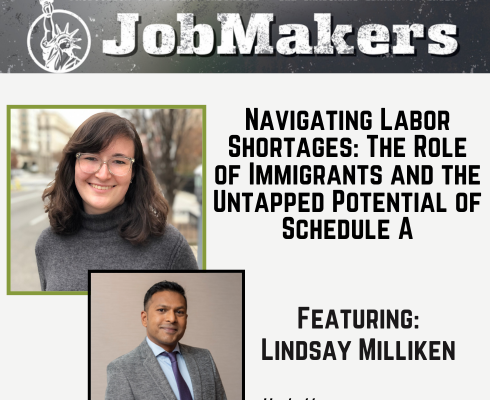
Navigating Labor Shortages: The Role of Immigrants and the Potential of Schedule A
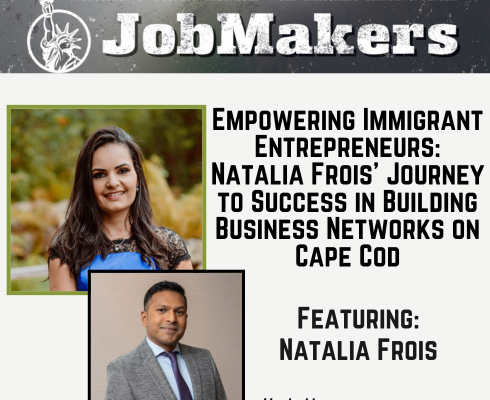
Empowering Immigrant Entrepreneurs: Natalia Frois’ Journey to Success in Building Business Networks on Cape Cod
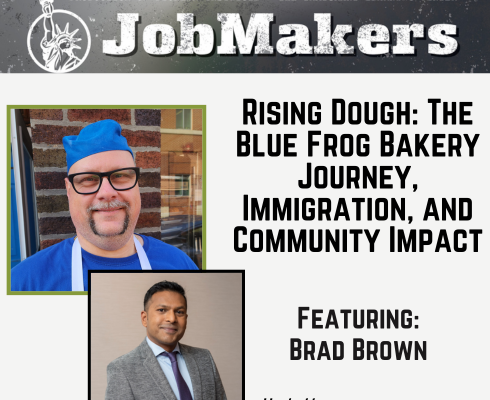
Rising Dough: The Blue Frog Bakery Journey, Immigration, and Community Impact
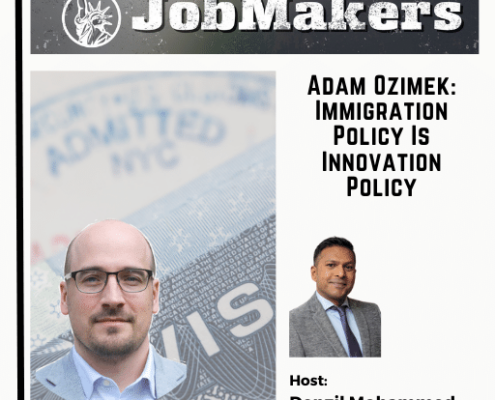
Adam Ozimek: Immigration Policy Is Innovation Policy
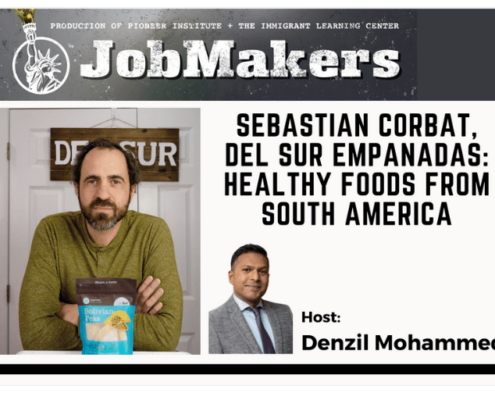
Sebastian Corbat Brings Us Healthy Foods ‘From the South’
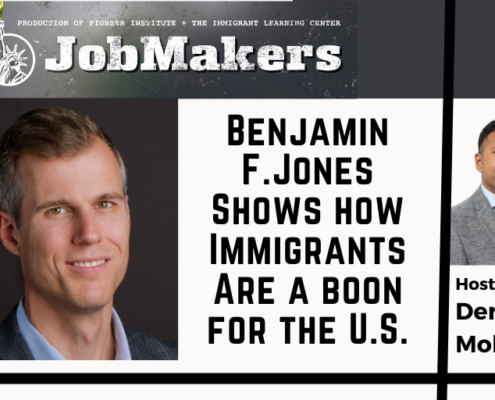
Benjamin F. Jones Shows How Immigrants Are a Boon for the U.S.
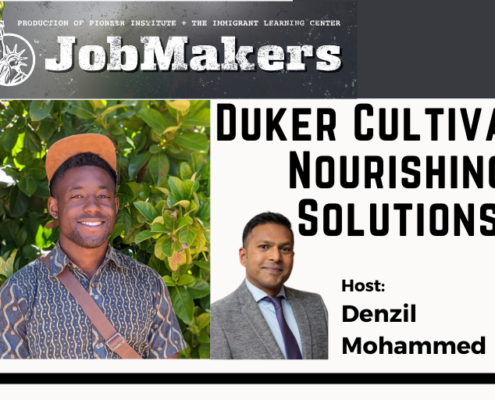
Duker Cultivates Nourishing Solutions
